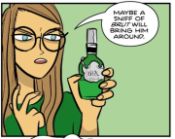|
The Oldest Man posted:No the nazis were also good, see, it was really a move in the name of peace for all to let them take over the government and business after they lost the war I mean say of the nazis what you will, but at least they kept the commies out*.
|
|
|
|

|
| # ? May 7, 2024 02:50 |
|
The sheet-pan chicken and roasted broccoli are out of the oven, and white rice is steaming on the stove. Virginia Sole-Smith, who has spent a decade writing about how women think and feel about their bodies — and how they pass along those feelings to their children through food — is about to serve dinner to her daughters, Violet, 10, and Beatrix, 6. Sole-Smith tries not to be a short-order cook. “Respect the labor,” is how she puts it, reminding her children that if they don’t like what she has prepared, there’s other stuff to eat in the house. A pullout shelf in the pantry holds Tate’s chocolate chip cookies, Goldfish crackers, pea snaps, and chocolate kisses. There are raspberries and grape tomatoes in the fridge. What Sole-Smith hopes to model, she said in a five-hour interview at her home in Cold Spring, N.Y., is “that you can be a mom who doesn’t live solely in service of other people.” That “you deserve time to yourself and that you’re a person with needs, that those needs matter.” She ferries the girls’ plastic plates to the front-porch table, evading the miniature Bernedoodle, Penelope. A year ago, Sole-Smith published “Fat Talk: Parenting in the Age of Diet Culture,” a guide to helping parents grapple with their discomfort and anxiety about weight and food. At the moment when Ozempic-like drugs are enabling people to become thin, Sole-Smith has become one of the country’s most visible fat activists, calling out the bias and discrimination faced by people in bigger bodies, especially from doctors and research scientists. She asserts her own right to be “fat,” the preferred adjective in her corner of the internet. In Sole-Smith’s house there are neither “good” or “bad” foods nor “healthy” or “unhealthy” ones; doughnuts and kale hold equivalent moral value and no one polices portion size. By relieving herself and her family of rules about eating, Sole-Smith believes she will have a better chance of raising children who are proud of their bodies, trust themselves to enjoy their food and leave the table when they’re full. She serves dessert and snacks, like Cheez-Its, along with the dinner entree; her kids can eat their meal in any order. “Fat Talk” is, in a way, Sole-Smith’s manifesto of liberation from what nutritionists call “diet culture”: the enormous pressure American women, in particular, feel to be thin and to raise thin children. For many years, she covered health (including for The New York Times), and her reporting on the pursuit of thinness prompted her rejection of it. For Sole-Smith, “diet culture” has come to symbolize all the crushing expectations under which American women live. In her Substack newsletter and podcast, Burnt Toast, she muses on whether hewing to a household budget, gardening only with native plants, or limiting kids’ screen time can be regarded as diets. Sole-Smith separated from her husband Dan Upham last June, and in that upheaval has had to reconsider many family rituals, including dinner. Sole-Smith and Upham attempted a regular dinner hour — Upham said he considered it “sacrosanct” — but when they split, neither child wanted to come to the table at all. And then Sole-Smith hit on a fix: She released her kids from the pressure to politely converse by allowing them to read at the table. At dinner on this cool night, each girl grabs a brownie and then, after a few bites of broccoli or chicken, wanders off to play on the large rocks that line the front lawn. As she eats, Sole-Smith wonders aloud whether heterosexual marriage itself might be a diet. “There’s a thing with marriage where you’re like, ‘But he’s a good guy. But it’s pretty good. Like, this is fine. Like, I shouldn’t blow up our lives,’” she said. At the same time, she continued, “Shouldn’t I want more freedom than this?” Just as Sole-Smith progressed from trying to wrestle her body into thinness in her 20s to accepting herself at 42, she is also trying to relinquish the notion that marriage — “especially to this thin, attractive man who finds me sexy” — is a marker of success. “We would all do a lot better to be less afraid of divorce, just as we would do a lot better to be less afraid of being fat,” she said. “What if you just let go?” Sole-Smith has emerged as an inspirational, infuriating voice on the subject of bodies at a moment when there is no neutral zone. Since “Fat Talk” became a New York Times best seller last May, Burnt Toast has grown to nearly 50,000 subscribers — mostly white, straight, millennial mothers who have struggled with eating, body image, and weight. In Sole-Smith’s reader survey, about half of her audience identified as “fat.” On Burnt Toast no pro-weight-loss comments are allowed. The most fervent 10 percent of Burnt Toast adherents pay $50 or more per year for extra content, which provides Sole-Smith an annual salary of about $200,000, twice as much as she ever made as a freelance writer. Her fans love her for giving them permission to stay off the scale at the doctor’s office and for teaching them how to talk to their kids about bodies and food. Amy Nemirow, a subscriber from suburban Philadelphia, said the community at Burnt Toast helps her “look in the mirror and appreciate how I look and what my body is capable of.” Sole-Smith relies on scientific research to bolster her message. Data shows that being shamed about weight is linked to depression, anxiety and social isolation, as well as poor physical health. Significant weight loss through dieting is extremely hard to sustain. Bias from doctors can lead to avoidance of medical care and worse health outcomes. Eating disorders — including bingeing and anorexia — are common in people in larger bodies. “The consequences are clearly demonstrated,” said Kelly Brownell, a professor emeritus of public policy at Duke University who has spent five decades studying obesity and its prevention. “They’re social in nature, psychological, and medical, too. When you add all that up, it clearly means that weight stigma is having an impact on health.” The relationship between weight and health is extremely complex, and longitudinal studies can’t predict any individual’s vulnerability to disease. Still, decades of research demonstrates a strong association between excess fat and increased risk of five of the top 10 leading causes of death in the United States: cardiovascular disease, cancer, stroke, diabetes and liver disease. Doctors who focus on obesity are alarmed by the growing percentages of Americans who have it — 42 percent by the latest count. “I think it’s possible to simultaneously hold in your mind that the condition of obesity is concerning, while at the same time protecting the rights of the people who have it,” Brownell said. “You can think of many other parallels, like depression or alcoholism, where you don’t want the people who have these things to be stigmatized — there are clearly negative effects of that — but it doesn’t mean you discount the ravages of those diseases.” Like most internet personalities, Sole-Smith deploys her persona — a self-confident suburban mother with enviable hair and an obsession with gardening — in service of her battle cry: a body is not anyone else’s problem to solve. Sole-Smith does not dispute that in some cases, excess fat may contribute to disease, but she believes that weight stigma is “the foundation of everything about weight and health that nobody has been looking at for so long.” She is part of a fractious, vocal band of activists and advocates who argue that the real epidemic is bias, not obesity. Some reject even the word “obesity,” which is a medical diagnosis, as derogatory, too tangled with a long history of sexism and racism from doctors, advertisers, and health editors to be neutral. What most riles readers who encounter Sole-Smith is the calm assurance with which she lays down arguments that seem to defy common sense. This is especially true when she talks about Oreos, as she has done many times, and did again when I asked her about them in Cold Spring. Her position is, in a way, the wedge that divides her fans from her haters and draws attention online. Sole-Smith says that parents need not be concerned about how many Oreos their children eat (the same goes for Halloween candy and ice cream), and when I asked her whether a boundary — say, three Oreos at a time — might be sensible, she pushed back. “What happens when your kid goes on a play date to my house? I can tell you. Your kid eats nine Oreos,” she said. If parents put restrictions on foods, then children will never figure out how to eat according to their bodies’ own needs, she explained. When she said such things publicizing her book, readers went mad. A short, positive review in the Washington Post garnered more than 1,700 comments, with an overwhelming number calling Sole-Smith silly, immoderate, and anti-science. “Just letting kids be fat is a form of abuse,” one reader wrote. In The Cut, one commenter, of more than 340, wrote, “It’s like saying kids will intuitively choose math lessons over cartoons and video games.” But Sole-Smith is committed to her stance. At her last checkup, her blood work showed high cholesterol for the first time, and her doctor suggested she limit saturated fats and start baking cookies with margarine. She’s waiting to see her results “in a year when I’m not launching a book and getting divorced,” she said, with a small laugh. If her cholesterol warrants medication at her next visit, “then great. Medication,” she said. “But no. I will not pursue intentional weight loss to manage a cholesterol level.” As she sees it, the risks to her mental health by restricting her diet outweigh whatever other benefit she might gain. Sole-Smith was raised by divorced parents in Guilford, Connecticut, an affluent suburb of New Haven. Her mother, who is English, was an insurance executive. Her father was a political science professor at Yale, and later at the University of Pennsylvania. Marian Sole preferred a restaurant meal after a long day at work. Rogers Smith, an avid exerciser, would pat his belly when offered dessert and say, “TFA,” which meant, “too fat already.” Through her father, Sole-Smith belongs to the family that founded H.D. Smith, a national pharmaceutical wholesaler acquired in 2018 by AmerisourceBergen. “It was the back story of my life, and it does shape my life,” Sole-Smith said. “It provides a lot of financial security for my family,” she added. “It is not a privilege I earned, and it is an enormous privilege.” Sole-Smith started out in women’s magazines in the early 2000s, when “thin” equaled “healthy” and master cleanses were de rigueur. She didn’t consider herself a dieter, but she scheduled her workday around her trips to the gym, which in turn were timed around reruns of “The West Wing,” because, she said, “I could only stand to be on the treadmill if I was watching ‘The West Wing.’” She ran half marathons. “They were the ‘can you have it all’ years,” she said. “You’re going for the big job. You’re going for the perfect body. You’re going for the great marriage. You’re going for motherhood. You’re going for the perfect home.” She did not begin to reconsider her relationship to food and fat until 2013, when Violet, then four weeks old, was diagnosed with a severe congenital heart defect. Violet required a dozen surgeries, and for most of the first two years of her life was fed through tubes. One consequence was that when she was physically strong enough, she did not know how to eat. Having been passively nourished for so much of her life, her brain did not recognize her appetite. “The Eating Instinct: Food Culture, Body Image, and Guilt in America,” Sole-Smith’s first book, published in 2018, described how she learned to relinquish her fantasies about motherhood and nourishing her child so that Violet might survive. “The Eating Instinct” offered up “intuitive eating,” a feeding method established in the 1990s that was gaining traction among millennial parents. It suggested that all the old rules — “clean your plate” and “no dessert until after dinner” — might not apply. When Violet was 2, Sole-Smith and Upham had to overcome their acculturated anxieties about the sugar and fat in chocolate milk. Violet started drinking half a gallon each week. In Cold Spring, Sole-Smith said she would write the book very differently today. For one thing, she was still using the words “obese” and “obesity” without qualification. And some part of her was blaming people in bigger bodies for a lack of discipline. “I was still thinking at that point that a fat body was a problem to solve,” she said, “versus this is what your body is meant to be.” “The Eating Instinct,” a quiet book, sold about 2,000 copies in print. “I do think being more clear on a provocative argument, versus asking careful questions about it, is just more marketable,” she said, in retrospect. Sole-Smith didn’t have a moment of radicalization. It was more like a gradual shift in perspective. After “The Eating Instinct,” she began to encounter ideas she hadn’t previously grappled with, she said. She was already familiar with the work of the nutritionist Lindo Bacon, whose 2010 book, “Health at Every Size: The Surprising Truth About Your Weight,” challenged doctors to treat patients without recommending weight loss. Sole-Smith also knew Lisa DuBreuil, a clinical social worker in Boston who sees people with eating disorders. When introducing someone to fat activism, DuBreuil often starts by saying that “it’s normal for there to be a wide range of body sizes. That fat people have always existed,” she said in an interview. The relief and recognition can be very strong. Educating Sole-Smith was like watching a person “stepping out of the matrix,” she added. In 2019, Sole-Smith read “Fearing the Black Body: The Racial Origins of Fat Phobia” by Sabrina Strings, a sociologist at the University of California, Santa Barbara, which reframes the cultural and medical concern about obesity as “a way to craft and legitimate race, sex, and class hierarchies.” Sole-Smith started to absorb the larger capitalist critique: Even fat activism had been co-opted by women’s magazines, advertisers, and fitness companies and turned into “body positivity,” a defanged version that “really centers, you know, ‘small fat’ white women like me,” Sole-Smith said, using the identifier she learned around then. Sole-Smith started to spell the word “ob*sity” wherever she could. Sole-Smith began to feel that her freelance specialty, analyzing obesity research studies for editors at mainstream publications, was “just exhausting and not moving the needle.” She increasingly felt that discrimination was the problem, not proving or disproving that excess fat made people sick. “It doesn’t matter what people’s health status is. Right? Drug addicts are worthy of dignity and respect in medical care. Like, it doesn’t matter whether you caused it, doctors are supposed to meet you where you are,” Sole-Smith said in Cold Spring. Upham saw a change come over her. “When she was in magazines, that was a job. This felt more like a calling,” he said. In September 2020, Sole-Smith wrote “What If Doctors Stopped Prescribing Weight Loss?” an article that evoked the analogy between weight stigma and racism. By then, she had given up trying to dress to de-emphasize her shape. She had moved, definitively, into plus sizes, and found freedom in finally accepting herself. She embraced horizontal stripes, conventionally proscribed for women in bigger bodies. It felt “a little subversive,” she said. Life in the Cold Spring house grew stressful as the pandemic wore on. The dog wouldn’t stop barking. Violet was attending second grade at her private school in a mask and mostly outdoors. Beatrix was 3. Sole-Smith was working on “Fat Talk” and building Burnt Toast. The extroverted Upham, who worked in communications, was going stir crazy in isolation. He had always been outdoorsy, hiking in the White Mountains or trail running in the Shawangunks. But now, cut off from his friends and two years into sobriety, he began running with urgency on the trails by their house. “I ran hundreds of miles,” he said. Child care was on the list of topics they argued about, Upham said. For her part, Sole-Smith was newly aware of “the value of comfort eating,” she said. “We demonize it so much.” She began to think about all the ways that she and her friends had punished themselves by abstaining from food. “I deserve softness. I deserve a little tenderness,” she said. “Everything is chaos. It’s nice I can make brownies.” In almost every respect, Upham had “an easy time” with Sole-Smith’s radicalization, he said. But he did find the notion of “de-prioritizing exercise” to be “challenging” — and not because he regards physical activity as a virtue. Hardcore exercise is his way of life. “It’s hard for me to see past that sometimes,” he said. In the spring of 2021, with Americans exhausted and edgy and many only recently vaccinated, Sole-Smith emerged as a voice of reassurance. In April, she published a piece in Good Housekeeping saying she had no intention of getting her prepandemic body back. “When it’s safe to re-enter the world, my sweatpants are coming with me,” she wrote. When new studies reported trends of pandemic weight gain, Sole-Smith went on Brian Lehrer, the WNYC call-in show. “Anything you had to do for your mental health in the last year, whether that was more comfort eating, more sleep, more anything, that was a good choice for your health,” she told a listener who felt terrible about regaining the 50 pounds he lost before the pandemic. It was around this time that she and Upham had an argument about butter. Beatrix had eaten a whole stick, “jammed it in her mouth,” Sole-Smith said in Cold Spring, because she thought it was cheese. Upham — whom Sole-Smith describes as more of a “rules guy” — wanted to intervene, but Sole-Smith disagreed. “If I put butter on the table and a kid wants to eat the butter, that’s fine with me,” Sole-Smith said. (Upham said he now regrets his response. He probably thought eating a whole stick of butter was “just disgusting,” he said, “but I really am on team calories.”) Ozempic became a national obsession in the winter of 2023, just as Sole-Smith was heading out to promote “Fat Talk,” giving her a foothold in the news cycle that she could not have anticipated. The more she became known for dismantling anti-fatness, the more editors and bookers invited her to give her opinion. That January, Sole-Smith wrote an opinion piece for The New York Times responding to new guidelines issued by the American Academy of Pediatrics that recommended Ozempic-like drugs for a subset of obese children as young as 12. The first chapter of “Fat Talk” is titled “The Myth of the Childhood Obesity Epidemic,” and in her article, she wrote, “We cannot solve anti-fat bias by making fat kids thin.” This view prompted an outcry. Dr. Barry Reiner, a pediatric endocrinologist in Baltimore, was “personally infuriated,” he said, and stayed up past midnight one night writing a letter to the editor. Historically, Type 2 diabetes has been an adult-onset disease, but “for the past several years, I’ve been seeing a lot more of it,” Dr. Reiner said. “These children are not going to have a healthy life, or a normal life span.” While it’s theoretically possible for a person to carry a lot of excess weight into maturity and remain healthy, “I think that’s a vast minority, maybe approaching a myth,” Dr. Reiner added. In his newsletter ConscienHealth, Ted Kyle, who formerly worked in obesity policy for GlaxoSmithKline, called out Sole-Smith for ignoring facts, “which don’t melt away because our feelings are strong.” He linked to a study from Yale University that showed a rising prevalence of fatty liver disease during the pandemic among children with obesity — a condition that can lead to “liver cancer, cirrhosis, and death,” Kyle wrote. Then, in April, Sole-Smith went on “Fresh Air” and offered a political analysis. “Celebrating a thin white body as the ideal body is a way to other and demonize Black and brown bodies, bigger bodies, anyone who doesn’t fit into that norm,” she said. Social media predictably exploded at this. On Fox, Greg Gutfeld mocked Sole-Smith’s “horrible, stupid” remarks. On the Reddit channel “fatlogic,” one person queried whether it wasn’t racist for “middle class white women to be casting themselves as the victims of racist violence and chattel slavery,” while another wondered, “Has she not seen black people that already are skinny/slim/fit? We’re not all ‘thick’ or obese.” In May, after “Fat Talk” hit the best-seller list, Sole-Smith took a victory lap on Instagram. Wearing a bright pink dress, she posted some of the hate messages she had received. “I can see why you’re single. No one wants to spend time with a fat slob shoving pizza in her fat mouth,” read one. As these notes flashed across the screen, she ostentatiously ate a brownie. Earlier in our conversation in Cold Spring, Sole-Smith talked about all the ways in which every person undermines their own health, by drinking alcohol, say, or opting out of the gym; even people who refuse to wear motorcycle helmets are freer from judgment than fat people, she said. During dinner, with the girls playing in the yard, this question of autonomy came up again, in a more philosophical way. I asked Sole-Smith what it meant to make less-than-optimal choices about personal health in the name of autonomy when others — children, family members, friends, a community — are dependent on you. “Health is a resource and a privilege so many people don’t have access to,” Sole-Smith began. There are mothers who are substance users, older mothers, and mothers with congenital health conditions. No parent has an obligation to pursue good health, and to believe so “is fundamentally a very ableist perspective,” she said. She continued, “Is health that I eat this broccoli for dinner? Or is health that I managed to have a few minutes of connection with my daughter today?” Sole-Smith announced her separation in September in the most viral issue of Burnt Toast to date, but neither she nor Upham will say why they split. They had been together since high school, and Upham has been a character in Sole-Smith’s work at least since Violet was born. What Sole-Smith does say is that she’s become “deeply critical of the institution of marriage and what it asks from straight women.” In her writing and talking about marriage (and divorce) on Burnt Toast, she denounces the unequal division of emotional labor that so many women in her cohort complain of: the hours spent planning meals and communicating with teachers and arranging play dates in addition to their full-time jobs. “Deciding to get divorced is terrible. Being divorced is amazing,” she said. As Sole-Smith considers all the ways she is enjoying her release from what she calls “the hyper-competent oldest daughter in me,” she notices that Beatrix is beginning to shiver in her thin T-shirt. Another rule to which Sole-Smith fails to adhere is appropriate outerwear, she said, with a laugh. Her girls are always either overdressed or underdressed. She yells toward Beatrix. “Are you done with your chicken?” But Beatrix, wearing headphones, doesn’t hear. Sole-Smith leans down and gives Beatrix’s dinner to the dog.
|
|
|
|
Some Guy TT posted:Virginia Sole-Smith, who has spent a decade writing about how women think and feel about their bodies — and how they pass along those feelings to their children through food — is about to serve dinner to her daughters, Violet, 10, and Beatrix, 6. https://www.youtube.com/watch?v=DfITfSPjBmM
|
|
|
|
To quote a post I read elsewhere on this site: "These cope articles are always so loving long lol"
|
|
|
|
Some Guy TT posted:The sheet-pan chicken and roasted broccoli are out of the oven, and white rice is steaming on the stove. Virginia Sole-Smith, who has spent a decade writing about how women think and feel about their bodies — and how they pass along those feelings to their children through food — is about to serve dinner to her daughters, Violet, 10, and Beatrix, 6. Jesus Christ, there isn't a TL;DR big enough
|
|
|
|
Smith was her married name now she’s the Sole Smith (I regret what I read of it)
|
|
|
|
tates cookies loving suck
|
|
|
|
all the news thats fit to print
|
|
|
|
like a lot of these articles there's a single interesting point that briefly gets touched upon (managing both physical and mental health and wellness simultaneously) that gets buried in an ocean of paragraphs of the trite personal struggles of someone fully invested in their self-importance
|
|
|
|
double post
|
|
|
|
The NYT loves fascists. Why are they being so mean to Biden, then?!?
|
|
|
|
an update lol https://twitter.com/JohnHMcWhorter/status/1783649851961389474
|
|
|
|
Wraith of J.O.I. posted:an update lol
|
|
|
|
hadji murad posted:Smith was her married name now she’s the Sole Smith its actually a really appropriate metaphor for how she takes a real problem (fat shaming and whether to keep a married name after divorce for professional slash parenting reasons) and stakes out a third option thats somehow worse than any of the existing choices
|
|
|
|
lolquote:Sole-Smith was raised by divorced parents in Guilford, Connecticut, an affluent suburb of New Haven. Her mother, who is English, was an insurance executive. Her father was a political science professor at Yale, and later at the University of Pennsylvania.
|
|
|
|
nobody's getting a sympathetic profile in the new york times without being some kind of multimillionaire heir
|
|
|
|
Some Guy TT posted:The sheet-pan chicken and roasted broccoli are out of the oven, and white rice is steaming on the stove. Virginia Sole-Smith, who has spent a decade writing about how women think and feel about their bodies — and how they pass along those feelings to their children through food — is about to serve dinner to her daughters, Violet, 10, and Beatrix, 6. https://x.com/dril/status/473265809079693312
|
|
|
|
Rich ladies hijacking the phrase "emotional labor" to mean "being a decent human being who contributes something to a relationship" from its intended and original meaning of performing emotions for pay disgusts me every time I''m sorry you can't be the sociopath you want to be at all times like the guy you married is, big L there no question, but that's not what emotional labor is.
|
|
|
|
Scrub-Niggurath posted:Jesus Christ, there isn't a TL;DR big enough
|
|
|
|
this is all sorkins workings quote:She didn’t consider herself a dieter, but she scheduled her workday around her trips to the gym, which in turn were timed around reruns of “The West Wing,” because, she said, “I could only stand to be on the treadmill if I was watching ‘The West Wing.’”
|
|
|
|
where do these idiots like rfk jr get off telling people to guzzle down ivermectin to treat covid what kind of crazy country is this where we have to treat any idiot with a moneyed last name like hes smarter than people who went to medical school anyway remember that woman whos been doing articles for us about how nutrition is junk science pushed by fat hating extremists i really liked the cut of her jib we should put out a profile this month about the heroic stand shes taking against orthodoxy
|
|
|
|
The Dada Era of Internet Memeswww.newyorker.com - Wed, 24 Apr 2024 posted:Last December, a factory in the Chinese province of Hebei called Donghua Jinlong posted a marketing video to TikTok showing aerial clips of its campus set to a jaunty tune. A caption proudly declared, in English, “Since 1979, Glycine comes from here.” Glycine is a niche industrial product, used as an additive in certain packaged foods and in chemical processes like pesticide production. It is, in other words, an unlikely candidate for a social-media campaign, yet the factory’s account kept giving the molecule the star treatment, like it was some sort of chemical influencer. The videos became more complex and ambitious. They featured bouncing animated text, A.I.-generated voice-overs, and so-called retention-editing tactics such as blurred transitions between clips. “A bunch of food grade glycine is being packed up feel free to inquire,” one post announced, solicitously. I stumbled upon the Donghua Jinlong videos in my TikTok feed late one night in March. The encounter felt a little bit like watching after-hours paid programming on TV: first bizarre, then vaguely amusing, then addictively hilarious. I almost wanted to place an order.
|
|
|
|
the nyt loves a grifter if they use white fragility language (intersectionality that carefully avoids mentioning class or proposing a systemic solution) instead of ranting about seed oils or whatever
|
|
|
|
Every one of these garbage "live a rules-free life" lifestyle brand personalities is ultimately just hawking PR spin in service of coca-cola, nestle, and kraft Oh you don't think you should have rules about how many Oreos your kids eat? Why the gently caress do you have Oreos in the house at all, tho? Your toddler didn't buy that poo poo and put it in the pantry.
|
|
|
|
The Oldest Man posted:Every one of these garbage "live a rules-free life" lifestyle brand personalities is ultimately just hawking PR spin in service of coca-cola, nestle, and kraft mad? The pullout shelf in the pantry holds Tate’s chocolate chip cookies, Goldfish crackers, pea snaps, and chocolate kisses. She serves dessert and snacks, like Cheez-Its, along with the dinner entree; her kids can eat their meal in any order.
|
|
|
|
mawarannahr posted:mad? The pullout shelf in the pantry holds Tate’s chocolate chip cookies, Goldfish crackers, pea snaps, and chocolate kisses. She serves dessert and snacks, like Cheez-Its, along with the dinner entree; her kids can eat their meal in any order. Real hurthling! posted:tates cookies loving suck
|
|
|
|
oreos are nasty. mallowmars are my real nabisco jam
|
|
|
|
Some Guy TT posted:where do these idiots like rfk jr get off telling people to guzzle down ivermectin to treat covid what kind of crazy country is this where we have to treat any idiot with a moneyed last name like hes smarter than people who went to medical school Why do you hate freedom, OP?
|
|
|
|
I don't know a way to read that article other than a white lady got divorced from her bro husband because she couldn't deal with him when they got trapped together during covid, got depressed, started depression eating, got fat as a result of the depression eating, and is now hurting her kids as one prong of a rationalization strategy that also involves fawning media profiles and a lifestyle brand Even if you sincerely believe that providing no guidance whatsoever to kids about how to eat healthy foods that will not kill you years before your time is correct because "health" purely means "vibes" now, and teaching kids Where this is ultimately going is a snack company marketing department's wet dream: not eating oreos for dinner is, itself, fat shaming
|
|
|
|
Wraith of J.O.I. posted:an update I'm sure that this guy is really good at teaching music, but he should probably refrain from commenting authoritatively on literally anything else lol.
|
|
|
|
Some Guy TT posted:it really pisses me off btw that this is like the first thing most people will say about kpop policywise but noone ever says it about sweden sweden did it in ye olde times of postwar europe. You know what they don't talk about? Korean esports and broodwar being a thing because of the large scale internet penetration in korea that one of the last 5 year plans in the ROK did. Starcraft didn't even have a korean translation back then!
|
|
|
|
Pistol_Pete posted:I'm sure that this guy is really good at teaching music, but he should probably refrain from commenting authoritatively on literally anything else lol. He's a linguist so I would not be sure at all.
|
|
|
|
Pistol_Pete posted:I'm sure that this guy is really good at teaching music, Really?
|
|
|
|
Wraith of J.O.I. posted:an update lol
|
|
|
|
The Oldest Man posted:
related: i noticed a while ago how every fad diet in my adult life is a variation on “avoid grains, but eat as much meat as you want.” People genuinely believe fresh sourdough bread is bad for you and bacon is fine. I have met multiple people who are now even starting to believe fresh fruit is bad for you, while eating unlimited meat. It’s got me a bit conspiracy theorizing on it - I bet the processed food and meat industries have had a hand in this.
|
|
|
|
Besides those industries, it's in a lot of people's interests to stop you from wondering why processed meat and carbs are readily available where fresh produce isn't.
|
|
|
|
Best Friends posted:related: i noticed a while ago how every fad diet in my adult life is a variation on “avoid grains, but eat as much meat as you want.” People genuinely believe fresh sourdough bread is bad for you and bacon is fine. I have met multiple people who are now even starting to believe fresh fruit is bad for you, while eating unlimited meat. It’s got me a bit conspiracy theorizing on it - I bet the processed food and meat industries have had a hand in this. there's been an uptick in attractive female fitness influencers convincing pear-shaped obese men who barely work out that the key to fitness is all meat diets it rules
|
|
|
|
quote:But Sole-Smith is committed to her stance. At her last checkup, her blood work showed high cholesterol for the first time, and her doctor suggested she limit saturated fats and start baking cookies with margarine. She’s waiting to see her results “in a year when I’m not launching a book and getting divorced,” she said, with a small laugh. If her cholesterol warrants medication at her next visit, “then great. Medication,” she said. “But no. I will not pursue intentional weight loss to manage a cholesterol level.” As she sees it, the risks to her mental health by restricting her diet outweigh whatever other benefit she might gain. Was "start baking cookies with margarine" specific medical advice
|
|
|
|
She'll write an article in a year on how she went on Ozempic and it's all our fault
|
|
|
|

|
| # ? May 7, 2024 02:50 |
|
lol https://twitter.com/TheLeadCNN/status/1783270365029883997
|
|
|




































